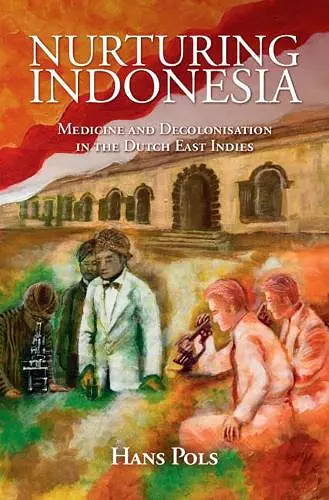Nurturing Indonesia
Medicine and Decolonisation in the Dutch East Indies
Format:Hardback
Publisher:Cambridge University Press
Published:9th Aug '18
Currently unavailable, and unfortunately no date known when it will be back
This hardback is available in another edition too:
- Paperback£29.99(9781108440677)

This examination of the formation of the Indonesian medical profession reveals the relationship between medicine and decolonisation, and its importance to understanding Asian history.
This history of medicine in Indonesia widens its scope to cover the social role of the medical profession. Pols' focus on decolonisation and the role of physicians in this political process means this study will appeal not only to historians of medicine but also to historians of Southeast Asia.Hans Pols proposes a new perspective on the history of colonial medicine from the viewpoint of indigenous physicians. The Indonesian medical profession in the Dutch East Indies actively participated in political affairs by joining and leading nationalist associations, by publishing in newspapers and magazines, and by becoming members of city councils and the colonial parliament. Indonesian physicians were motivated by their medical training, their experiences as physicians, and their subordinate position within the colonial health care system to organise, lead, and join social, cultural, and political associations. Opening with the founding of Indonesia's first political association in 1908 and continuing with the initiatives of the Association of Indonesian Physicians, Pols describes how the Rockefeller Foundation's projects inspired the formulation of a nationalist health programme. Tracing the story through the Japanese annexation, the war of independence, and independent Indonesia, Pols reveals the relationship between medicine and decolonisation, and the role of physicians in Asian history.
'This is a rigorous study of the social, intellectual and ethical spaces between nurturing and inuring, heroes and professionals, national and nationalist. Reading through the uniquely rich Dutch Indies and Indonesian archives on medicine, Pols has produced a book that will be of interest not only to historians of medicine and Asia, but also to historians of decolonization.' Rudolf Mrazek, University of Michigan
'Nurturing Indonesia is a vivid account of the place of medicine in the making of modern Indonesia. With masterful command of sources in Dutch and Indonesian, Nurturing Indonesia brings to life the place of medical doctors in Indonesia's national awakening. The book highlights the tensions they experienced between their medical vocation and their national aspirations and the influence of medical thinking on their conception of the nation. A fine book on the interplay between science and society in Southeast Asia.' Robert Cribb, Australian National University, Canberra
'Hans Pols' (University of Sydney) book offers fresh perspectives on the history of Indonesian nationalism and the sociopolitical role of medicine in the colonial context of the Netherlands East Indies. The book asks a deceptively simple question: why were doctors and medical students such prominent participants in Indonesia's nationalist movements? Many historians of Indonesian nationalism have observed that physicians and medical students played a leading role in those movements, but few have thoroughly investigated why this might be the case, and how exactly the relationship between nationalism and medicine worked. This is the gap filled by Nurturing Indonesia. … Nurturing Indonesia will have wide appeal, as it is written with clarity and in an engaging style.' Wayan Jarrah Sastrawan, New Mandala (www.newmandala.org)
'Nurturing Indonesia is a fascinating history. Pols draws on an impressive mix of Dutch and Malay sources … to bring to life his actors and their struggles. … Nurturing Indonesia offers a major contribution to our understanding of the role of the medical profession and indigenous physicians in non-western contexts.' David S. Jones, Metascience
'The strength of Nurturing Indonesia is its focus on the perspective of the indigenous medical professionals, the author's nuanced treatment of their political choices, and his innovative use of an admirable number of sources in Dutch and Indonesian.' Fenneke Sysling, Isis
'… the richness of research involved in producing this material showcases the history of medicine and nationalism in Indonesia. The contents of this book are both interesting and illuminating as Pols effectively illustrates the ideas and activities of Indonesian physicians in the Dutch East Indies, their socio-political role in politics, the national awakening that transpired throughout different periods and, finally, the relationship between nationalism and medicine.' Wan Faizah Wan Yusoff, Social Science Diliman
'This book is relevant for anyone interested in world struggles of identity politics. Through a detailed recount of the historical influence of medical students and physicians in politics in the Indonesian archipelago throughout the 20th century, the book gives insights into people's attempts to break racial and class caste systems through professional and political endeavours.' Theresia Citraningtyas, Asian Studies Review
'Pols therefore looks at the relationship between medicine, colonial modernity and decolonisation, very convincingly arguing, using an abundance of material, that it was the medics' commitment to medicine that inspired them 'to imagine a new, independent, and healthy nation'.' Leo van Bergen, Social History of Medicine
'Nurturing Indonesia is an important contribution to the history of medicine and decolonisation in Indonesia. The result of a long hunt for sources, the book vividly illustrates the ways in which medicine informed decolonisation and vice versa.' Sebastiaan Broere, Health and History
'This work is an impressive account of the past century of Indonesian history through the lens of medicine and its practitioners. This is the work of a master of the topic, and reflects his ability to apply the history of medicine to larger social and political developments in a nation, making it an important contribution in new approaches to the past in the region.' Timothy P. Barnard, Journal of Southeast Asian Studies
ISBN: 9781108424578
Dimensions: 235mm x 159mm x 18mm
Weight: 630g
302 pages